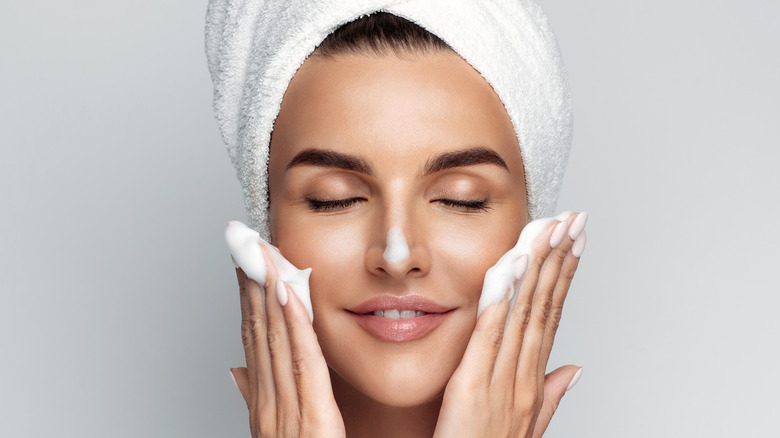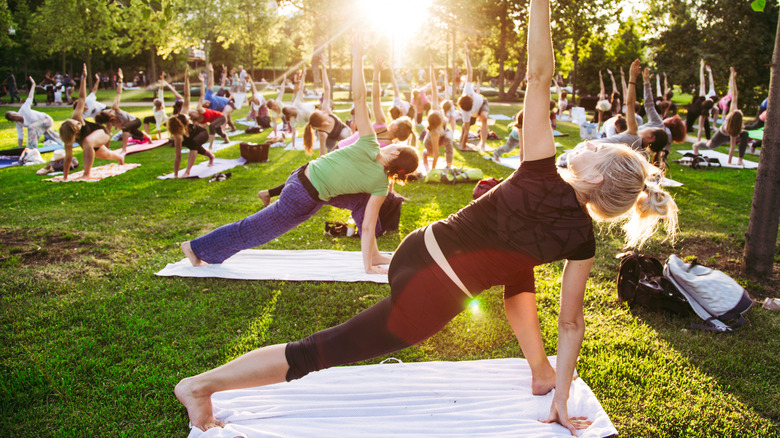Skincare Experts Reveal The Careers That Wreak Havoc On Your Skin
If your skin has been stressed, you might have your job to thank for that. There are many factors, from the commute to sitting in front of a computer all day, that contribute to breakouts, dry skin, and even the formation of lines and wrinkles.
Something as simple as no longer wearing a face mask can upset your skin. In fact, Dr. Robert Anolik, a fellow of the American Academy of Dermatology, told Today that your skin can get irritated from being re-exposed to dry air from indoor heating and cooling.
Stressed skin can also keep you stuck in a stress cycle. According to Harvard Health, "repeated exposure to psychological or environmental stressors can have lasting effects on your skin" as well as on your overall health. This can happen with something as seemingly benign, like ultraviolet light exposure or temperature change, where the skin will produce stress hormones that signal to the brain that the body is stressed.
Dr. Loretta Ciraldo, a dermatologist and founder of her eponymous skincare line, told The New York Times that when the skin is stressed, it kicks up the production of cortisol, which robs the skin of oil and water and slows down good oil production altogether. Dr. Whitney Bowe, a dermatologist and author of "The Beauty of Dirty Skin," further explains that stress also stops the body from projecting hyaluronic acid and collagen, which help skin stay looking hydrated and young.
If you want naturally healthy skin, you want a job in this field
If you want to give your skin the best chance at staying plump longer, you're going to want to get a job in either the sports or leisure industry, according to a study done by Beauty Pie.
After surveying 3,000 employees across 15 different industries, Beauty Pie found that the jobs with the lowest "skin-stressing" factors were jobs where working late and stress were rare. Jobs in sports or leisure also made it easier for employees to eat healthier. According to The New York Times, "vitamins A and C (abundant in fruits and vegetables), lycopene (found in tomatoes), astaxanthin (salmon), and polyphenols (green tea, dark chocolate)" are among the antioxidants that maintain skin health, helping you radiate a natural glow. Beauty Pie also says to make sure you're not skipping lunch because, just like lack of sleep, skipping lunch will mess with your skin's glow. After all, some foods help with dull skin in miraculous ways.
Exercise, another great way to increase antioxidants, also helps inflammation. Dr. Health Woolery-Lloyd told The New York Times that even "[j]ust going outside and seeing a tree and looking at a few birds is proven to lower inflammatory markers in our body."
The jobs that were the worst for your skin, though, were jobs in fields like science, hospitality and tourism, and construction. Beauty Pie found these jobs often required employees to work late or overnight, in offices where there's only artificial light and heating, or outside all day, all of which stress one's skin.
How to take care of your skin while working in an office
Unfortunately for many of us, working a low-stress job outdoors isn't going to happen. We're stuck in offices, staring at computer screens. We're commuting to work again, subjecting ourselves to air pollution. So many of the things we do to survive a workday put our skin in jeopardy for breakouts.
Your number one skin defense is going to be a gentle cleanser. Dr. Sandy Skotnicki, dermatologist and author of "Beyond Soap," told Today that the best way to be proactive about your skincare is to use a cleanser that is meant to clean your skin without drying it out. "Harsh cleansers set you up for more irritation no matter what the situation is," Dr. Skotnicki explained. "This is because they disturb the skin barrier and lets in more irritation like pollution smoke, [and] cumulative make-up."
But if you're still managing maskne, Dr. Robert Anolik suggests grabbing a cleanser with benzoyl peroxide, which kills blemish, blackhead, and whitehead causing bacteria, and adding a treatment with retinol to your nightly skincare routine, per Today. You can also get some of the best retinol serums for youthful-looking skin at affordable prices, so it's a win-win situation.
It sounds simple, but a great moisturizer is also going to be your skin's savior now that you're back in the office. As The University of Tennessee Medical Center explains, moisturizing "can reduce the chance of developing extreme dryness or oiliness" and can even help hide breakouts.
Try adding these things to your daily routine
Sometimes, the answer to better skin is not more skincare products. While you can buy hyaluronic acid serums and collagen creams, these products don't fight or stop cortisol production, per The New York Times. In addition to a skincare routine, you may want to try adding a few other things to your daily routine to help keep your skin looking young.
It's no secret that heating and cooling systems, like those used in office buildings, dry out the body. But if you think your body, especially your skin, feels more dried out than normal, you're right. Masks, Dr. Robert Anolik told Today, were actually good at keeping skin from drying out. Besides getting a good moisturizer, Dr. Ranella Hirsch, a dermatologist, told Today that a humidifier will be your skin's best defense against office life. "Adding that bit of humidity into the air will go a long way to soothe and limit sensitivity," she explained.
You may also want to try meditating every day. Harvard Health reported there is "some evidence that meditation may lower overall [stress hormone] levels in people who do it regularly." Dr. Heather Woolery-Lloyd, a dermatologist, explained to The New York Times that meditating "initiates the relaxation response, which activates the body's parasympathetic nervous system and decreases cortisol and inflammation." She says that a meditation routine can also help prevent skin from leaking moisture, helping your skin to stay looking younger and brighter.



